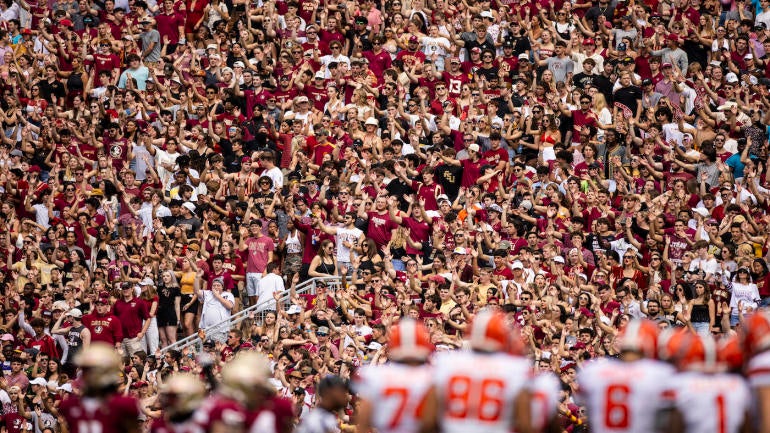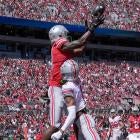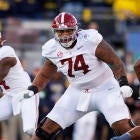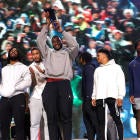
College football attendance increased in 2023 by a number that's likely equivalent to the crowd attending an average game-day tailgate: 27. It's small growth but a rise nonetheless as the average attendance ticked up from 41,840 fans per game in 2022 to 41,867 last season.
That rise continues to shatter long-standing fallacies. In court filings the past few years, the NCAA has preached that player compensation would be the death of the amateur model. As a result, fans would stop watching and attending games. Rollicking tailgates would be reduced to Kool-Aid socials!
Well, drink up, loyal tailgaters. The truth has proved to be the exact opposite.
The 2023 attendance figure is college football's highest since 2017, based on official NCAA records. In fact, FBS attendance has risen across consecutive seasons for the first time since 2008. Not since the all-time record of 46,971 fans per game that same year has the sport been more popular in the stands and the living room. TV ratings last season were arguably the highest ever, depending on preferred metrics.
In 2022, average attendance rose for the first time in eight years. The per-game increase of 1,992 fans was the second-highest in history, and it also contributed to the largest year-over-year increase in 40 years. (The NCAA has been keeping attendance figures since 1978.)
FBS attendance
| Season | Attendance | Change |
|---|---|---|
2014 | 44,603 | -1,068 |
2015 | 43,933 | -670 |
2016 | 43,612 | -321 |
2017 | 42,203 | -1,409 |
2018 | 41,856 | -347 |
2019 | 41,477 | -379 |
2021 | 39,848* | -1,629 |
| 2022 | 41,840 | +1,992 |
| 2023 | 41, 867^ | +27 |
* Lowest since 1981
^ Highest since 2017
Houston changed conferences as well as its trajectory. The Cougars had the nation's largest attendance increase by percentage (+45.3%) and second-largest increase by game (+10,626) last season. That's a result of Houston joining the Big 12 and Texas coming to town for the first time in 22 years.
"I want to make sure I say this the right way," Houston athletic director Chris Pezman said. "The regionality of the schedule we're playing now, the familiarity of the opponents [is] what everyone in this town grew up with. Just the presence they have in the state of Texas. That's what really moves the needle for us."
Dismiss, for a moment, the reconfigured Big 12 being as far-flung as any league; it will soon stretch from Arizona to Utah to Florida to Ohio. At Houston, there is enough geographic familiarity. Instead of playing the likes of East Carolina, Temple and Charlotte in the AAC, Houston has renewed in-state rivalries with Baylor, Texas Tech and TCU from the old Southwest Conference. Fans can now drive to Oklahoma State to see a conference game.
Last year, eight of the Cougars' 12 games were played in the state of Texas. The school set a season-ticket record, adding 6,000 new packages with the Big 12 move. Not bad for a program that finished the season 4-8 and fired its coach.
"Getting Baylor here and TCU and Tech [in the league] … this is what conferences, in my opinion, [are] supposed to be about, being able to get in your car driving to a game and drive home afterwards," Pezman said.
Attendance changes by conference
| Conference | Avg. Attendance '22 | % Change YOY | Notes |
|---|---|---|---|
SEC | 77, 154 | +0.63 | Highest since '16 |
Big Ten | 66, 589 | -0.10 | 2nd-highest since '14 |
Big 12 | 55, 115 | -7.8 | 2nd-lowest since '00 |
| ACC | 48, 962 | +0.05 | Highest since '16 |
| Pac-12 | 48, 790 | +9.7 | Highest since '17 |
| Independents | 35,473 | +4.7 | Up consecutively for first time since '14 |
AAC | 24,100 | -14.7 | 2nd-lowest ever* |
MWC | 23, 223 | +2.7 | 3rd-lowest ever* |
| C-USA | 15,860 | -18.0 | Lowest ever |
| Sun Belt | 20,838 | +8.67 | Highest ever |
MAC | 14,055 | -1.40 | Lowest since '91 |
* Since inception of the American (2013), Mountain West (1999)
The on-field product on our treasured fall Saturdays has triumphed over any off-field distractions. Few care if Colorado's Shedeur Sanders drives a Maybach or Florida State's Jordan Travis' NIL value last season was well over $1 million. (D.J. Uiagalelei is currently rated No. 1 in NIL valuation at FSU.)
All that matters is whether the team is winning.
On-field success helped Florida State enjoy a similar attendance boost up to a nation-leading increase of 11,457 fans per game. It was a comeback of another kind during an undefeated regular season and ACC championship victory. Just four years ago, FSU had posted its lowest average attendance (54,019) since 1999.
Colorado coach Deion Sanders played a big role in both the attendance and ratings increases across the board. Having come off a 1-11 season, the Coach Prime-led Buffaloes accounted for four of the top 25 highest-rated games last season. That interest peaked when 10 million viewers watched the Sept. 23 clash at Oregon.
In the stands, Colorado sold out all its home games for the first time. Attendance in Boulder was up more than 30% from 2022, leading all Power Five schools. Folsom Field was filled to 105% of its capacity (53,180), the highest average in program history. As Sanders himself would say: "You know where to find me."
Attendance superlatives
- The Pac-12 led the FBS with a 9.7% attendance increase per game in the conference's last year of existence as we've known it. The average of 48,790 was the league's highest figure since 2017. Five of the top 10 increases among Power Five schools -- by percentage -- were from the Pac-12: Oregon State, Colorado, UCLA, Arizona State and Stanford.
- The SEC and ACC each posted their highest average attendance since 2016.
- For the 25th consecutive year, it was the SEC leading the country in attendance among its peer conferences.
- Michigan led the country in attendance for the ninth straight year and 26th out of the last 27 seasons.
- The top 13 in attendance were all Big Ten and SEC members.
- The SEC's total attendance in 2023 (7,715,363) was more than the entire Group of Five combined (7,492,672). The SEC is up 6% over the last two seasons.
- The previous low for year-over-year increase was nine per game from 2007-08 (46,962-46,971).
- In addition to Houston, the three other Big 12 newcomers (BYU, Cincinnati and UCF) enjoyed attendance gains.
- South Florida led all Group of Five teams with a 28% increase.
- The Sun Belt posted its highest attendance ever (20,838).





















